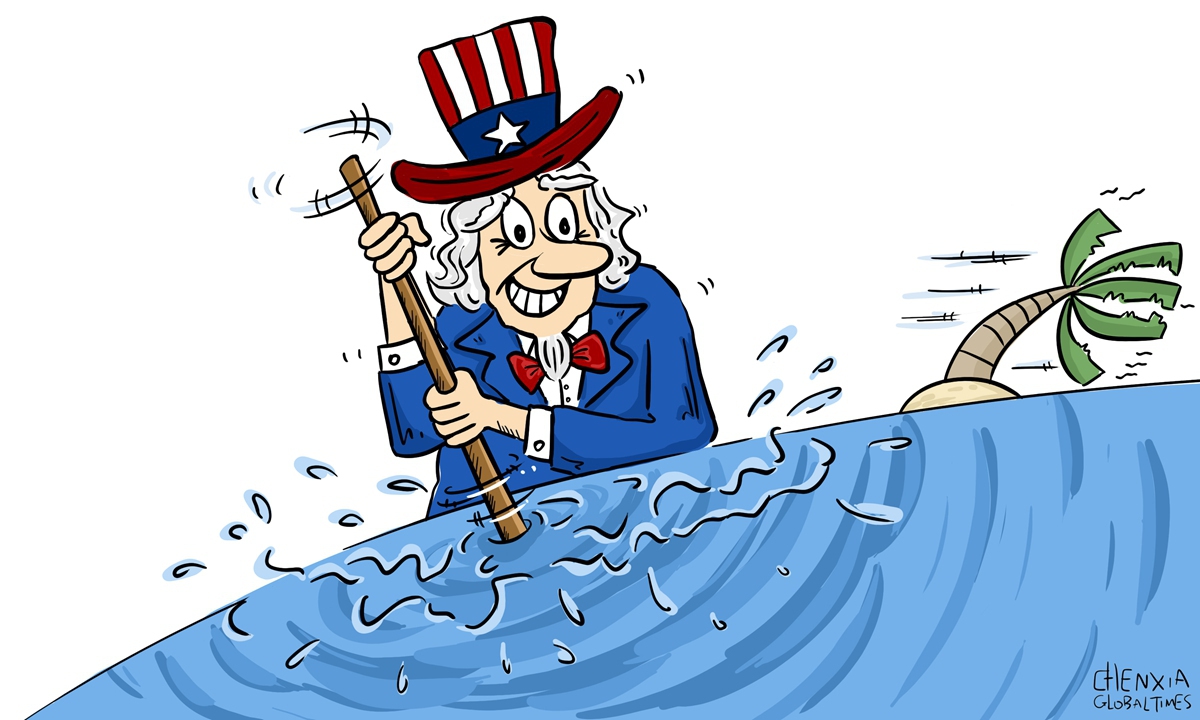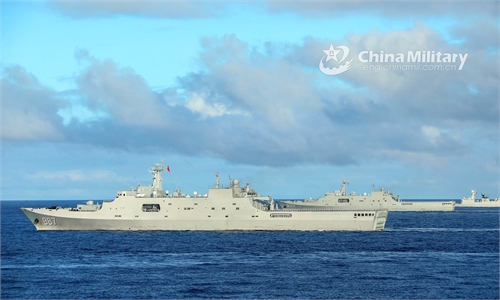
Illustration: Chen Xia/GT
US Indo-Pacific Commander Admiral John C. Aquilino said on Sunday that China has militarized at least three of several islands it built in the disputed South China Sea, arming them with anti-ship and anti-aircraft missile systems, laser and jamming equipment and fighter jets in an increasingly aggressive move that threatens countries operating nearby, the Associated Press reported on Sunday.
Aquilino claimed the "hostile actions" of China were in stark contrast to China's promise not to turn those islands into military bases. Such an accusation is not new. Chinese Foreign Ministry spokesperson Wang Wenbin had previously refuted similar accusations.
Deploying necessary defense facilities on relevant islands and reefs of the Nansha Islands is within China's sovereignty and has nothing to do with "militarization," Wang noted.
"By bringing up 'militarization' now and then, the US is making pretexts for strengthening its own military deployment and activities to pursue maritime hegemony in the South China Sea… The US is the major factor driving 'militarization' in the South China Sea," Wang said previously.
The AP report served as evidence of US' bullying practices in the region. According to the report, a US Navy P8-A Poseidon reconnaissance aircraft approached the Nansha Islands and refused to withdraw after it received a radio message from the People's Liberation Army aircraft demanding it to move away. The US plane continued approaching the islands, saying that it is "a sovereign immune United States naval aircraft." The US pilot said, "I am operating with due regard to the rights and duties of all states."
Song Zhongping, a Chinese military expert and TV commentator, said this is a typical move of the US military - it approaches to spy on the Nansha Islands. The US engages in provocation and troublemaking - it doesn't want to see stability in the South China Sea, Song said.
"The US hopes to use the South China Sea issue to worsen relations between China and ASEAN, and kidnap ASEAN to jointly confront China. What the US is doing adds fuel to the situation in the South China Sea, which will only make the region full of risks and conflicts," Song told the Global Times.
The Nansha Islands are Chinese territory. China's construction on its own territory is aimed to meet the civilian needs in the South China Sea, provide better public goods and services to the region and beyond, and fulfill China's international responsibilities and obligations. In the meantime, China's deployment of necessary defense facilities on relevant islands of the Nansha Islands is an exercise of the right to self-defense under international law. There is no difference from the defense moves of other countries on their own territory.
Song said the US has greatly enhanced military construction on Guam and that is too much even based on US logic.
Washington's main objective in the South China Sea is "to prevent war" through deterrence and promote peace and stability, Aquilino said, noting, "Should deterrence fail, my second mission is to be prepared to fight and win."
In this regard, Song said that there will be no change in the US strategy of containing China's rapid development. Aquilino's statement also proves that the Biden administration's promise - it has no intention to seek conflict with China - is completely untrue and untrustworthy. Song warned the US not to think it could continue to run roughshod in the South China Sea. "That history is over," Song said.
The Khmer Times published on March 15 an opinion piece advocating, "Never believe the hollow promise of liberation, hollow promise of collective security, hollow promise of creation of NATO-like organization."
Song echoed, saying, "We should step up efforts to reveal the real face of the US, to make sure ASEAN members have a deep understanding that the US is an outside country that incites disturbances in the South China Sea. ASEAN should not follow the US, or the South China Sea will become a sea of trouble for all regional countries."

